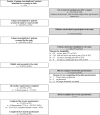Randomized Controlled Trial of a Home-Based Walking Program to Reduce Moderate to Severe Aromatase Inhibitor-Associated Arthralgia in Breast Cancer Survivors
- PMID: 28698390
- PMCID: PMC5634775
- DOI: 10.1634/theoncologist.2017-0174
Randomized Controlled Trial of a Home-Based Walking Program to Reduce Moderate to Severe Aromatase Inhibitor-Associated Arthralgia in Breast Cancer Survivors
Abstract
Background: In postmenopausal women diagnosed with breast cancer (BC), most BC tumors are hormone receptor positive and guidelines recommend adjuvant endocrine therapy that includes an aromatase inhibitor (AI). This study investigates the impact of a 6-week, home-based, self-directed walking program on the commonly reported side effect of AI-associated arthralgia (AIAA).
Materials and methods: In this phase II trial, consented BC patients were randomized to walking Intervention (n = 31) or Wait List Control (WLC; n = 31). Eligibility criteria included: stage 0-III BC, on AI for at least 4 weeks, ≥3 on a 5-point scale inquiring about joint symptom intensity "at its worst," and exercising ≤150 minutes per week. Outcomes were self-reported joint symptoms and psychosocial measures. Analyses comparing Intervention and WLC groups were conducted on an intention-to-treat basis to assess intervention impact at 6 weeks (postintervention) and at 6-months follow-up. Adjusted means were calculated to assess differences in two groups.
Results: In our final sample (n = 62), mean age was 64 years, 74% were white, and 63% had a body mass index of 30 or higher. At postintervention, Intervention group participants reported significantly increased walking minutes per week, reduced stiffness, less difficulty with activities of daily living (ADL), and less perceived helplessness in managing joint symptoms. At 6-months follow-up (postwalking period in both Intervention and WLC), walking minutes per week had decreased significantly; however, improvements in stiffness and difficulty with ADLs were maintained.
Conclusion: This study adds to the growing evidence base suggesting exercise as a safe alternative or adjunct to medications for the management of AIAA.
Implications for practice: Breast cancer survivors whose adjuvant endocrine treatment includes an aromatase inhibitor (AI) often experience the side effect of AI-associated arthralgia (AIAA). This study investigates the impact of a 6-week, home-based, self-directed walking program in the management of AIAA. Compared with Wait List Control, women in the Intervention group reported significantly increased walking minutes per week, reduced stiffness, less difficulty with activities of daily living, and less perceived helplessness in managing joint symptoms. This study adds to the growing evidence base suggesting exercise as a safe alternative or adjunct to medications for the management of AIAA.
Keywords: Aromatase inhibitor; Arthralgia; Breast cancer; Exercise.
© AlphaMed Press 2017.
Conflict of interest statement
Disclosures of potential conflicts of interest may be found at the end of this article.
Figures
References
-
- Taylor WC, Muss HB. Recent advances: Adjuvant therapy for older women with breast cancer. Cancer J 2010;16:289–293. - PubMed
-
- Beckwee D, Leysen L, Meuwis K et al. Prevalence of aromatase inhibitor‐induced arthralgia in breast cancer: A systematic review and meta‐analysis. Support Care Cancer 2017;25:1673–1686. - PubMed
-
- Crew KD, Greenlee H, Capodice J et al. Prevalence of joint symptoms in postmenopausal women taking aromatase inhibitors for early‐stage breast cancer. J Clin Oncol 2007;25:3877–3883. - PubMed
-
- Dent SF, Gaspo R, Kissner M et al. Aromatase inhibitor therapy: Toxicities and management strategies in the treatment of postmenopausal women with hormone‐sensitive early breast cancer. Breast Cancer Res Treat 2011;126:295–310. - PubMed
Publication types
MeSH terms
Substances
Grants and funding
LinkOut - more resources
Full Text Sources
Other Literature Sources
Medical


